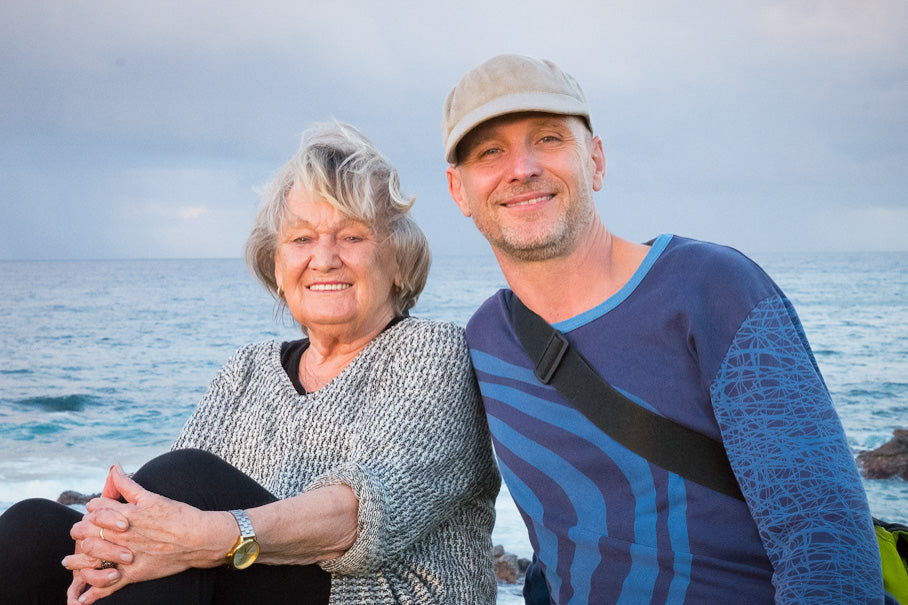
See why setting goals doesn’t seem to work
I am writing to you from the plane as I fly back from spending time with my mother, who has been critically ill. She began with pneumonia which progressed into overall weakness, immobility, and a neurological episode that left her arm paralyzed.
Some of you may have seen my note on social media about the situation, but for those who have not, with very short notice, I made the decision to fly 11 times zones to be at my mother’s side.
I am a big proponent of “taking the route of least regret,” and that is why I flew back to be with my mom, sisters, and our extended family, taking turns spending time with my mother day and night.
Despite having only 10 days with her before needing to leave, I feel that my mom really loved us being by her side and that my sisters and I have given her what she wanted most.
During our time together, there were a few bright moments. My mother, barely speaking, managed to ask in a whisper for some champagne and ice cream. And when I asked her what the best part of her life had been, she replied: “Men! Your dad was the best one!” (Even though they were divorced — go figure!)
Now I am on my way back, thinking about life and what it would be like if my mom were more open to following some of the health advice I had given her over the years, which brings me to the next part of this week’s piece.
Make small deposits, and don’t bet on winning the lottery.
Having spent more than three decades working with patients and close to six decades of being alive, I dare to share the following observation.
People often set goals of exercising, eating healthy, and getting more sleep, and they set similar health goals for their four-legged family members.
The problem is that setting goals on their own does not seem to be a reliable way of actually reaching them.
Let me give you some practical life examples:
- The goal of ‘exercising more’ doesn’t make people exercise more.
- The goal of ‘sleeping more’ doesn’t make people get more sleep.
- The goal of ‘feeding my dog fresh, wholesome food and supplements’ doesn’t make us necessarily do it.
- The goal of ‘caring for my dog’s teeth’ to prevent dental problems and avoid unnecessary anesthesia doesn’t make it happen.
How many people do you know who regret not achieving their goals? How many of them may even be resentful or jealous of people who have achieved what they wish in life?
Saying that we want to travel to Rome will not get us there. Instead, making a plan and outlining the journey will get you there.
Making a plan to save X amount of money each week, booking the ticket, packing, and then setting an alarm for the flight time are the steps we must take.
When it comes to setting health-oriented goals, wanting to prevent heart disease and diabetes is not enough; achieving the goal requires a bit of luck but, most of all, discipline and dedication.
To demonstrate this, I have revised the examples I gave you a few lines above to make them achievable step-by-step:
The goal of ‘exercising more’ can be adjusted to:
I will exercise three times a week for an hour under the guidance of a particular teacher/program. Or another example could be closing exercise rings on your Apple Watch or iPhone 4x a week.
The goal of ‘sleeping more’ can be adjusted to:
I will end any activity by 9:30 pm and be in bed by 10 o’clock with the exception of Saturday. I will not drink coffee after 12 pm. I will go to the sauna and do a cold water plunge twice a week to improve my sleep quality. I will not use my mobile device after 8 pm.
The goal of ‘feeding my dog fresh, wholesome food and supplements’ can be adjusted to:
I will prepare my dog’s fresh meals in batches every Monday and Thursday, so there is enough to feed fresh food six days a week. I will put all of my dog’s supplements into smaller daily jars every Sunday so that I can easily add them into meals before feeding.
The goal of ‘caring for my dog’s teeth’ to prevent dental problems and avoid unnecessary anesthesia can be adjusted to:
I will check my dog’s teeth on the last weekend of every month and have hand scaling done every three months. I will mark this on my calendar and buy my favourite dog-friendly ice cream to share with my dog when the job is done.
I trust that reading the above examples clarifies the difference between setting a goal we want to achieve versus actually planning the journey step-by-step.
There is also one other way to stick to your goals.
If you want to reduce your calorie intake when someone offers you a dessert, you can say something like, “I only eat cake once per week, and I already had one dessert earlier this week.”
And when your dog begs at the table, you can tell them, “I love you, but I give you food only from your bowl and not while I am eating.”
Let me know what you think, and have a fantastic day! ❤️
